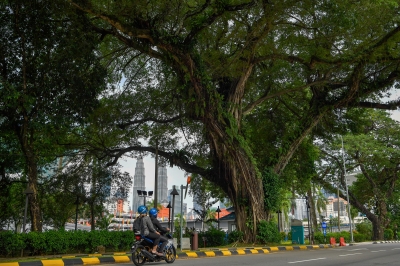KUALA LUMPUR, Sept 30 — In a personal mission to green the country’s urban landscape, renowned Malaysian consultant, entrepreneur, and author, Chandran Nair, has been rolling up his sleeves and planting saplings where old trees once stood.
Along the roads and pedestrian pathways of Jalan Ara and Jalan Tempinis in Bangsar, in the capital city of Kuala Lumpur, Chandran has been quietly working to replace felled Angsana trees by turning their decaying stumps into new life.
These large stumps, some as big as three by two feet, pose a challenge — they are difficult to remove and dangerous to pedestrians, yet leaving them to rot is unsightly. But where others see an obstacle, Chandran sees an opportunity.
Armed with saplings from his nursery in Jelebu, Negeri Sembilan, he and his assistant have been planting a variety of trees, from the vibrant African Tulip to the sacred Ficus, along the streets of Bangsar. Many of these trees now thrive in front of eateries and banks, adding both shade and charm to the neighbourhood.
Each tree bears a sticker with a simple message: “Protect the plant, save the world, take care of Malaysia.”
It’s a sentiment Chandran embodies, planting trees between his hectic work and travel schedule. His initiative isn’t just about aesthetics; it’s about reclaiming urban spaces for nature.
When asked about his motivation during an interview with Bernama’s former news-editor SN Rajan, Chandran explained, “Urban environments are becoming harsher and more dehumanising. Cities seem to be built for cars and malls, not for people. Trees can soften the hard edges of our concrete jungle, giving us back some of the serenity we’ve lost.”
He speaks passionately about the “silent war” being waged in cities across Malaysia, where planners and developers cut down trees in the name of progress. “Somehow, we’ve become so afraid of leaves falling on our streets or coconut trees dropping their fruit. It’s as if nature is the enemy.”
Chandran cites Prime Minister Datuk Seri Anwar Ibrahim’s call for Kuala Lumpur City Hall (DBKL) to plant 100 trees for every one removed, and he’s determined to do his part.
“I decided to start in my own neighbourhood, where over the years, hundreds of trees have been cut down, leaving nothing but stumps. I’m replanting in all these spots-public spaces that deserve to breathe again.”
But Chandran’s vision extends beyond Bangsar. He dreams of a nationwide tree-planting movement, where citizens take ownership of their green spaces. “Imagine if just 100 people in KL planted 100 trees each. That’s 10,000 new trees. And if 1,000 residents across the Klang Valley did the same? We’d transform the city.”
While Chandran’s project has received support from some residents and even foreign workers, he’s faced surprising opposition.
“In an upper middle-class area, you’d think people would welcome more greenery. But some homeowners actively oppose planting, even though it’s public land. They fear trees, leaves, and the animals they attract. It’s baffling.”
Undeterred, Chandran continues to engage the community, fostering a sense of responsibility for the trees he plants. He’s particularly inspired by the support of foreign workers, who have not only adopted his trees but even started their own small gardens around them.
Chandran’s hope is that this grassroots movement will spread to schools, where students can be taught the value of tree planting and community involvement.
“It’s more than just learning how to plant. It’s about building a sense of ownership and connection to the environment. And it only takes an hour a month.”
As for the saplings? Chandran is confident there’s no shortage, with potential support from DBKL, the Forest Research Institute Malaysia (FRIM), and corporations that could donate trees.
“Imagine the impact if companies like CIMB, Maybank, and Petronas got involved, contributing to a future where our cities are lush and green.”
Chandran’s passion project is already transforming his neighbourhood, but his vision is far bigger-one that stretches across Malaysia, from Seremban to Penang. With a bit of effort and community spirit, Malaysia’s cities could be reimagined, one tree at a time. — Bernama

